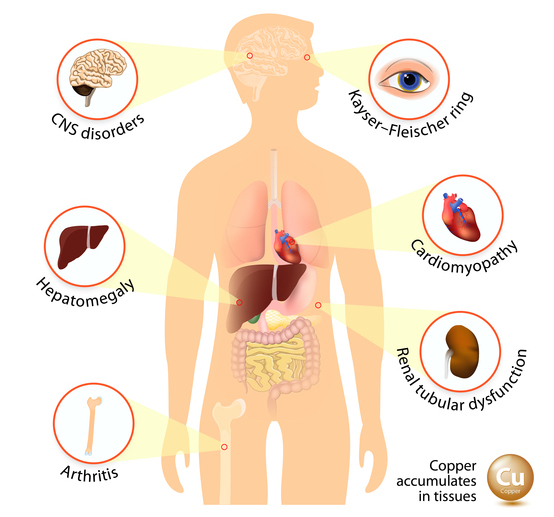| Name | Wilson's Syndrome |

Wilson's Syndrome
What is Wilson's Syndrome?
Wilson's Symptom or disease is a rare inherited disorder in which copper accumulates in your liver, brain and other vital organs. Most people with Wilson's disease are between the ages of 5 and 35, but it can affect young and old people as well.
Copper plays an important role in the development of healthy nerves, bones, collagen and skin pigment melanin. Normally, copper is absorbed from your diet and utilised as a nutrient. Access amount of copper is excreted from your body through the liver. But in people with Wilson's disease who can not excrete copper rather accumulates in the body which is extremely life-threatening. When diagnosed early, Wilson's disease is curable, and many people with this disorder can live normal lives.
Symptoms
Wilson's disease is congenital and many people are born with this disease, but the signs and symptoms of the disease do not appear until copper starts accumulating in the brain, liver or other organs. The degree and type of symptoms of this disease depend on the affected part of your body.
The following symptoms are usually seen in this disease: Fatigue
- Lack of appetite or abdominal pain
- Yellowing of skin and whites of eyes (jaundice)
- Kayser-Fleischer rings
- Accumulation of fluid in the legs or abdomen
- Problems with talking, swallowing food or physical coordination
- Uncontrolled movement or muscle stiffness
Reason
Wilson's disease is an autosomal recessive trait that is inherited, which means you must inherit a copy of the defective gene from both parents to develop the disease. If you only get an abnormal gene from any of your parents you will not get sick yourself, but you are a carrier of this disease and later this abnormal gene can be passed on to your children.
Risk Factors
If your parents or siblings have this disease, you may be at risk for Wilson's disease. Ask your doctor for a genetic test to find out if you have Wilson's disease. Early diagnosis increases the chances of recovery from this disease.
Complications
Leaving this disease untreated could lead to the following complications:
- Liver Cirrhosis: Excess copper deposits form scar tissue in the liver which makes it more difficult for the liver to function.
- Liver Failure: It can occur suddenly or develop slowly over a number of years. In this case, you may need a liver transplant.
- Persistent Nervous problems: Vibration, involuntary muscle movement, movement and difficulty speaking are commonly associated with Wilson's disease. However, treatment for Wilson's disease can improve these problems. However, some people continue to have neurological problems despite treatment.
- Kidney problems: Wilson's disease can damage the kidneys, leading to kidney stones and abnormal levels of amino acids in the urine.
- Psychological problems: Personal changes, depression, boredom, bipolar disorder or psychosis can be the psychological problems of this disease.
- Blood problems: Destruction of red blood cells (hemolysis) can lead to anemia and jaundice.
Remember, early diagnosis is very important for recovery from this disease.

 Bangla
Bangla English
English